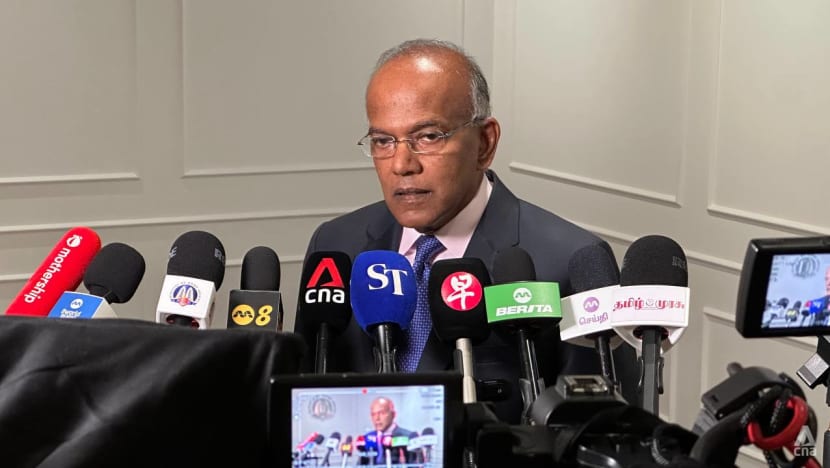Bangladeshi preacher used passport with different name to enter Singapore to give illegal, extremist sermon
The Ministry of Home Affairs says it is investigating Bangladeshi national Amir Hamza for illegally preaching to Bangladeshi migrant workers at a dormitory.

Law and Home Affairs Minister K Shanmugam speaking to reporters at the Ministry of Home Affairs headquarters on Aug 21, 2024. (Photo: CNA/Fabian Koh)

This audio is generated by an AI tool.
SINGAPORE: A Bangladeshi extremist preacher managed to enter Singapore and deliver an illegal sermon here because he used a passport with a name different from what was in the country’s security databases, the Ministry of Home Affairs (MHA) said on Wednesday (Aug 21).
MHA said its Internal Security Department was aware of Amir Hamza’s background, but “did not have his biometrics at the time of his entry”.
The ministry said it is investigating the Bangladeshi national for preaching, without approval, to migrant workers at the Lantana Lodge dormitory in Tuas. It is also probing the organiser of the event on Aug 9 and others involved.
“Amir Hamza’s sermon propagated extremist and segregationist teachings that were dangerous, and detrimental to Singapore’s communal harmony,” said MHA.
BALANCE AT THE BORDERS
Speaking to the media on Wednesday, Law and Home Affairs Minister K Shanmugam said Singapore has to strike a balance between its security needs and the experience of travellers coming here.
“You’ve got to remember, people from all over the world come into Singapore. We have to keep the airport experience friendly. People have to feel welcomed to Singapore,” he said.
At the same time, the Immigration and Checkpoints Authority (ICA) has the “very difficult” task of guarding against people like Amir Hamza from entering Singapore.
Mr Shanmugam noted that Singapore has blocked preachers from entering in the past, including by turning them away at borders.
In May 2022, Indonesian preacher Abdul Somad Batubara arrived at Tanah Merah Ferry Terminal and was denied entry and sent back to Batam on the same day.
“In this case, he (Amir Hamza) managed to get through,” said Mr Shanmugam.
When asked by CNA if there will be a review of the agencies’ processes, Mr Shanmugam said: “You cannot be interviewing every person who is coming in as if he is maybe a potential radical, or someone who might be a radical.”
The minister said what ICA could do differently is to identify every incoming traveller and ask them detailed questions – but that would hurt the airport experience and Singapore’s tourism industry.
“On the face of it, he (Amir Hamza) was no different from any other person coming into Singapore … We will look at it, but bearing in mind that we need to make sure that we balance the security needs with the needs of the economy too,” he said.
ESPOUSING EXTREMIST VIEWS
MHA said in a press release that the Bangladeshi national had in his Aug 9 sermon called non-Muslims “kafir”, which means infidels.
“He also held up alleged Bangladeshi extremists as bastions of religious piety, including several leaders of the Islamist party Jamaat e-Islami, which is banned in Bangladesh, and whose members had been arrested for involvement in alleged terrorist activities,” said MHA.
Amir Hamza had also politicised his sermon. He called the previous Bangladeshi government – led by former Prime Minister Sheikh Hasina – “oppressors”, and claimed that they had sentenced to death people who opposed them.
“He also claimed that victory will come when Bangladesh becomes an ‘Islamic country’,” said MHA.
Neither Amir Hamza nor the organiser had applied for the necessary approval for him to give a sermon in Singapore, added the ministry.
He left Singapore the next day on Aug 10, and the authorities received police reports on Aug 12.
ATTRACTED SECURITY ATTENTION BACK HOME
Amir Hamza has attracted security attention in Bangladesh for his alleged extremist teachings and terror links, said MHA.
“He has reportedly promoted religious intolerance, hatred and violence in his sermons. He is also alleged to be an influential figure in Ansar al-Islam (AAI), a pro-Al-Qaeda terrorist organisation operating in Bangladesh,” said the ministry.
In 2021, he was arrested in Bangladesh for his purported terror links, terrorism-related activities and inciting militancy. He was reportedly released on bail in December last year while awaiting trial.
Amir Hamza's speeches have also allegedly influenced a Bangladeshi AAI-linked terror suspect who planned to attack the Bangladesh parliament.
He had reportedly admitted to deliberately misinterpreting religious teachings and spreading extremism through his sermons, said MHA.
ZERO TOLERANCE
The authorities are investigating those involved in the Aug 9 event and will “take strong action" if they are found to have breached Singapore's laws or posed security concerns.
This includes deportation, prosecution or detention under the Internal Security Act.
“The Singapore government takes a very serious view of hate and extremist speech. We will not tolerate anyone, foreign or local, spreading and promoting views that threaten Singapore’s security, or our racial and religious harmony,” said MHA.
It also reminded foreigners not to import their politics into the country or carry out activities here in pursuit of such agenda.
It also said that foreigners looking to conduct talks in Singapore that are “religious, cause-based or political in nature” have to obtain a Miscellaneous Work Pass, adding that organising or participating in a public assembly without a police permit is not allowed.
“Despite our best efforts, some people of security concern will slip through our checks and get into Singapore because we are open and welcoming to the world.," said MHA. "The public can help us by staying vigilant, and reporting suspicious individuals and activities to the authorities."














